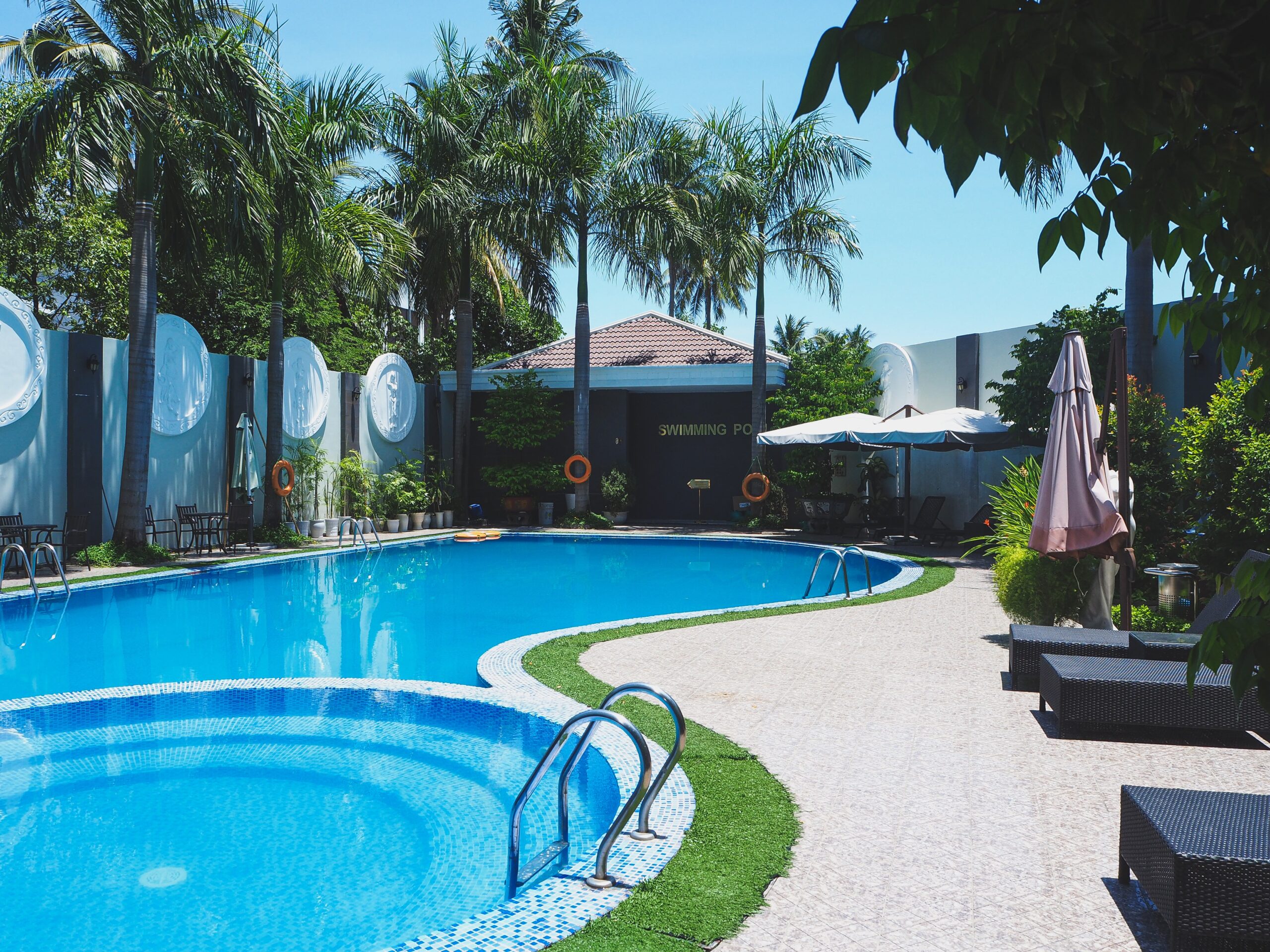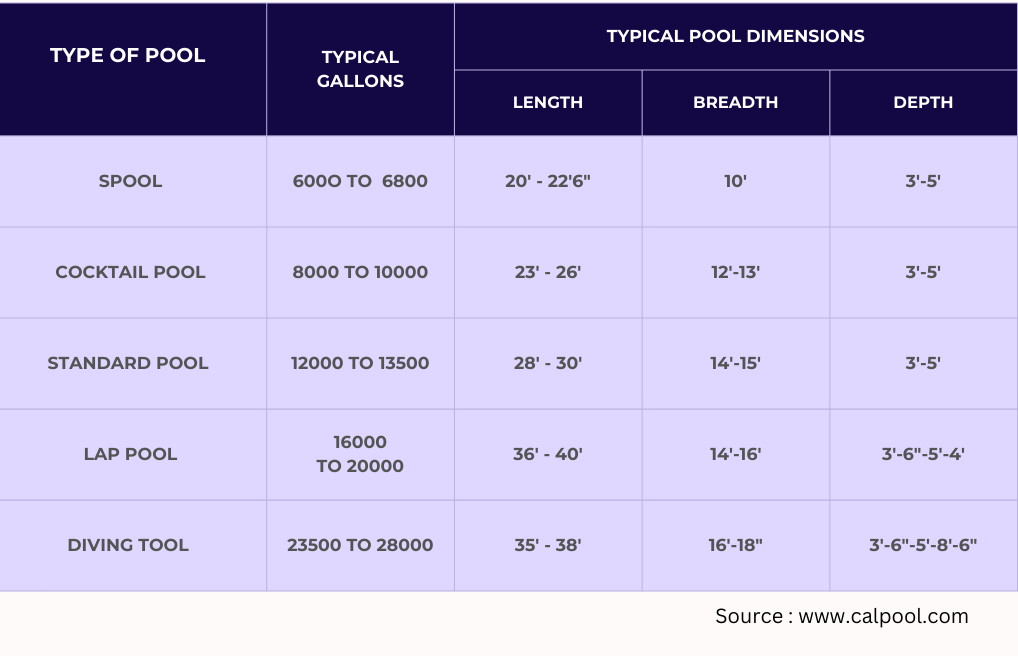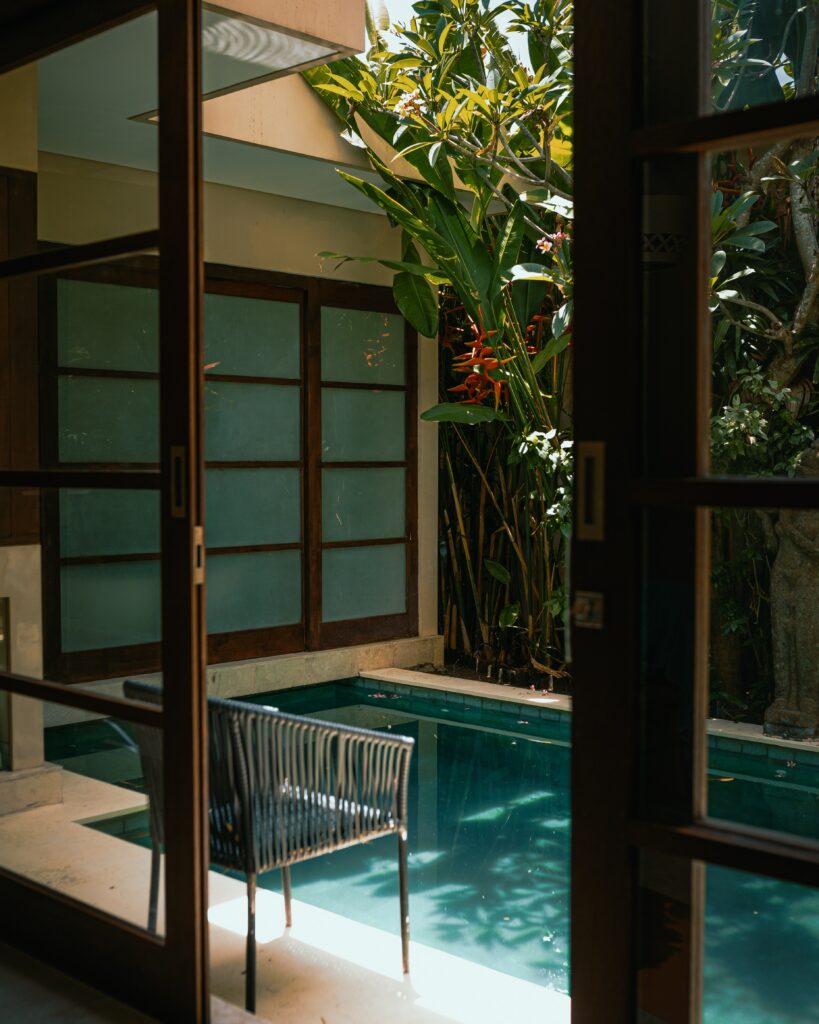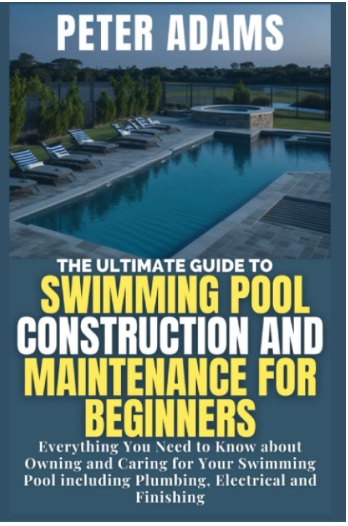
Table of Contents
What is the ideal size for a home swimming pool? This critical decision necessitates a number of considerations, both practical and artistic. One of the most important decisions you’ll have to make is the size of your pool. A swimming pool in your backyard can be a magnificent and enjoyable addition to your property, providing a location for leisure, fitness, and entertainment. In this tutorial, we will look at the aspects that influence the size of your home swimming pool, assisting you in creating a refuge that precisely meets your needs and preferences.
1. Understanding Your Space for Home Swimming Pool
The dimensions and arrangement of your backyard will have a significant impact on the size of your swimming pool. Begin by carefully measuring the available space and taking into account any distinctive elements, such as trees, hills, or structures, that may affect the placement and size of the pool. A crude drawing or the use of landscaping software can help you visualize how the pool will fit into your outside environment.
2. Purpose and Usage
The principal function of your home swimming pool will have a substantial impact on its size. Do you want a pool mostly for pleasure and relaxation? A smaller, more intimate pool might be appropriate in this scenario. If you want to use the pool for fitness and lap swimming, a longer and narrower shape is better. Understanding how you intend to utilize the pool can help you determine the appropriate proportions.
3. Family Dynamics
Consider the composition of your family and the people who will be using the pool on a daily basis. When you have little children, safety is a key priority. A shallow portion or a gradual entry will make the pool more family-friendly in such instances. Furthermore, if you frequently organize parties or have a large family, a larger pool ensures that everyone can enjoy the space comfortably.
4. Budget Considerations
It’s critical to understand that the size of your swimming pool can affect both the original building costs and the long-term maintenance expenditures. Larger pools necessitate more materials, more water to fill, and perhaps greater heating and filtration energy expenses. Before deciding on a size, carefully consider your budget to ensure you select measurements that are within your financial range.
5. Aesthetic and Landscaping
Your home swimming pool should blend in with the general style of your backyard. The scale should be appropriate for your landscaping and any existing outdoor buildings. Consider how the shape and proportions of the pool will interact with the surrounding elements. Consider incorporating space for elements such as a deck, patio, or outdoor seating area, which can improve the whole poolside experience.
6. Local Regulations and Codes
Each region has its own set of pool installation restrictions and codes. These can include things like setback requirements, fences, and safety measures. To guarantee that your pool project conforms with legal standards, research and understand the local legislation governing pool sizes and other pertinent elements.
7. Maintenance and Upkeep
Larger home swimming pools take more time and work to maintain. Cleaning, water treatment, and equipment maintenance become increasingly difficult as pool size increases. Consider the practical factors of pool care and how much time you’re willing to devote to keep your pool in top shape.
8. Seeking Professional Advice
Home Swimming Pool designers and contractors bring considerable knowledge to the table. They can assess your space, understand your needs, and make solutions that are specific to your scenario. By consulting with specialists, you can make an informed decision and avoid any hazards related with pool size and design.
Furthermore, several sorts of popular pools are given, and after reading this, you will be able to determine which ones meet your style and requirements-
9. SPOOL
A “spool,” in the sense of home swimming pools, is a mix of a spa (hot tub) and a pool. This modest and adaptable water feature combines the advantages of a relaxing spa and a smaller-sized pool. The name “spool” is a portmanteau of the words “spa” and “pool,” and it describes this novel combination.
Features of a Spool
Size: A spool is smaller than a standard swimming pool but larger than a traditional spa. Its proportions are typically 20 to 22 feet in length and 8 to 10 feet in breadth.
Depth: Spools are typically created with variable depths, with a shallow section for relaxing and a deeper one for a more immersive experience.
Heating: Spools, like spas, include heating systems that allow you to enjoy warm water all year long, making them ideal for year-round use.
Hydrotherapy: Many spools include built-in jets that provide hydrotherapy benefits similar to traditional hot tubs.
Versatility: Spools are versatile areas that can be utilized for relaxing, socializing, aquatic activities, and even cooling down in the summer.
Space Efficiency: Spools are an excellent choice for homeowners with limited outside space who desire a combination of spa-like elegance and pool-like activity.
Design Options: Despite their modest size, spools can be customized with a variety of finishes, water elements, lighting, and seating configurations.
Advantages of Spools:
Space Optimization: Spools are perfect for properties where a full-sized pool might not be feasible due to space constraints.
Year-Round Enjoyment: With heating capabilities, spools can be used regardless of the weather, providing a relaxing escape even during the colder months.
Lower Maintenance: The smaller size of spools results in reduced maintenance compared to larger pools, making them more manageable for homeowners.
Hybrid Experience: A spool offers the benefits of both a spa and a pool, giving you a diverse range of aquatic experiences in one compact unit.

10. COCKTAIL POOL
A “cocktail pool” is a small, shallow home swimming pool created primarily for leisure, mingling, and sipping beverages. This type of pool is distinguished by its modest size, making it a suitable addition to smaller outdoor spaces or residences with limited space. The name “cocktail pool” refers to its intended purpose, which is to provide a place for people to congregate, unwind, and enjoy cocktails in a relaxing aquatic setting.
Features of a Cocktail Pool:
Size: Cocktail pools are typically smaller than traditional swimming pools. They often range from around 23 to 26 feet in length, 12 to 13 feet in breadth, and are shallower, with depths ranging from 3 to 5 feet.
Shape: These pools come in various shapes, including geometric, rectangular, and even custom designs, depending on the available space and the homeowner’s preferences.
Seating: Cocktail pools often incorporate built-in benches, ledges, or seating areas along the edges of the pool. These provide spots for relaxation and conversation while partially submerged in the water.
Water Features: To enhance the ambiance, cocktail pools may include water features such as fountains, bubblers, or small cascades.
Aesthetics: Despite their smaller size, cocktail pools can be designed with various finishes, tiles, and decorative elements to match the overall aesthetic of the property.
Integration: Cocktail pools can be seamlessly integrated into outdoor living spaces, complementing patios, decks, and lounging areas.
Advantages of Cocktail Pools:
Space Utilization: Cocktail pools are perfect for maximizing the use of smaller yards or spaces where a larger pool might not be practical.
Socializing: The shallow depth and seating areas make cocktail pools ideal for gatherings and social events, allowing guests to stand, sit, or wade comfortably.
Cooling Off: These pools provide a refreshing option for cooling off during hot summer days without the commitment of a larger pool.
Relaxation: The tranquil atmosphere of a cocktail pool makes it an inviting space for relaxation, whether you’re enjoying a drink, reading a book, or simply soaking in the water.
Low Maintenance: The smaller size translates to lower maintenance requirements in terms of water treatment, cleaning, and overall care.
11. STANDARD POOL or PLAY POOL
A “standard pool” or “play pool” is a traditional form of home swimming pool that is primarily intended for recreational use. These pools are commonly seen in residential settings and are noted for their adaptability, providing a space for a variety of water activities and passive enjoyment. Let’s take a look at the features, qualities, and advantages of a standard or play pool.
Features of a Standard or Play Pool:
Size and Shape: Standard pools come in various sizes and shapes, ranging from classic rectangular designs to more freeform and custom shapes. They can be tailored to fit the available space and the homeowner’s preferences.
Depth: These pools usually have a gradual depth progression. The shallow end is typically around 3 to 4 feet deep, while the deep end can range from 5 to 8 feet deep.
Diving: While some standard pools have a deep enough area for diving, diving boards or platforms are less common due to safety concerns. Most standard pools are designed with a focus on recreational activities rather than diving.
Features: Standard pools can incorporate various features such as steps, benches, and ledges for lounging or seating. Water features like waterfalls, slides, and fountains can also be added to enhance the recreational experience.
Water Sports: These pools are suitable for a range of water activities, including swimming, playing pool games, water aerobics, and general aquatic fun.
Landscaping and Aesthetics: Homeowners have the flexibility to landscape around the pool, adding decking, patio areas, and landscaping features to create a cohesive and inviting outdoor space.
Benefits of Standard or Play Pools:
Versatility: Standard pools are designed with versatility in mind, accommodating a variety of activities and age groups.
Family-Friendly: These pools are well-suited for families with children, providing a safe and enjoyable space for kids to learn to swim, play, and have fun.
Recreation and Relaxation: Whether you’re swimming laps, engaging in water sports, or simply lounging by the poolside, a standard pool offers options for both recreation and relaxation.
Entertainment: Standard pools are great for hosting gatherings, parties, and social events, providing an appealing backdrop for outdoor entertainment.
Property Value: A well-designed and maintained standard pool can enhance the aesthetic appeal and overall value of a property.

12. LAP POOL
A “lap pool” is a sort of home swimming pool that is specifically intended for swimming laps and aquatic activities. Lap pools, as opposed to ordinary recreational pools, are designed with the goal of providing a long, straight length of water that allows swimmers to execute continuous laps without breaks. These pools are popular among fitness enthusiasts, athletes, and anyone who is dedicated to a regular swimming program.
Features of a Lap Pool:
Length and Shape: The defining feature of a lap pool is its length. Lap pools are typically longer than standard recreational pools, with lengths ranging from 25 to 50 meters (82 to 164 feet) or more. The width of a lap pool is narrower compared to traditional pools.
Depth: Lap pools often have a consistent depth of around 4 to 5 feet, providing a comfortable environment for lap swimming and exercises.
Lane Markings: Many lap pools include lane markings on the bottom, which assist swimmers in maintaining straight paths and sharing the pool space with others.
Minimal Features: Lap pools are designed for swimming purposes, so they usually have minimal features like steps, benches, or ledges. This streamlined design ensures an unobstructed swimming experience.
Water Quality: Lap pools typically have excellent water circulation and filtration systems to ensure water quality and clarity for swimmers.
Indoor and Outdoor Options: Lap pools can be installed indoors or outdoors, making them suitable for year-round use regardless of weather conditions.
Benefits of Lap Pools:
Fitness and Exercise: Lap pools are perfect for individuals who want to engage in low-impact cardiovascular exercise, swimming workouts, and aquatic training.
Space Optimization: Due to their narrow design, lap pools can fit into smaller spaces, making them ideal for properties with limited room for a larger recreational pool.
Focused Use: The primary purpose of a lap pool is swimming, which encourages swimmers to maintain a consistent and focused exercise routine.
Privacy: Lap pools can offer a more private and focused swimming experience, as they are not typically used for recreational activities.
Customization: While lap pools are designed with a specific function in mind, they can still be customized in terms of finishes, aesthetics, and additional features like underwater lighting.
13. DIVING POOL
A “diving pool” is a form of swimming pool that is specifically intended to accommodate diving sports in a safe manner. Diving pools, as opposed to normal recreational pools, are built with specific depth requirements and safety measures that allow divers to undertake a variety of dives. These pools are commonly found in aquatic centers, sports complexes, and facilities that host competitive diving and training.
Features of a Diving Pool:
Depth: The key feature of a diving pool is its depth. Diving pools are built deeper than traditional recreational pools to ensure the safety of divers. The minimum recommended depth for a diving pool is around 12 to 16 feet (3.7 to 4.9 meters) to allow for safe entry and sufficient water cushioning.
Diving Boards and Platforms: Diving pools are equipped with diving boards or platforms at various heights. These structures provide divers with a springboard from which to execute their dives.
Safety Measures: Diving pools adhere to strict safety guidelines to prevent accidents and injuries. These may include safety lines, clear markings indicating diving areas, and rules about diving techniques and distances from the boards/platforms.
Layout: Diving pools are often rectangular in shape to provide a clear and unobstructed area for divers to perform their maneuvers.
Water Quality and Circulation: Like other types of pools, diving pools have efficient water filtration and circulation systems to ensure clean and clear water for both divers and swimmers.
Benefits of Diving Pools:
Diving Training: Diving pools provide the ideal environment for athletes to train and perfect their diving techniques.
Competition: Diving pools are used for competitive events, including diving competitions at the amateur and professional levels.
Skill Development: Diving pools allow divers to practice and refine their skills, leading to improved performance and increased confidence.
Safety: The depth and design of diving pools ensure a safe cushion of water for divers, minimizing the risk of injuries.
